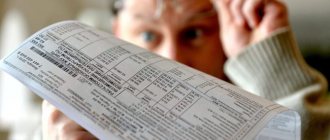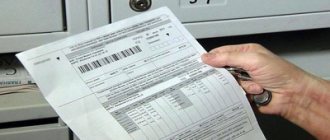- How to declare yourself bankrupt for housing and communal services
- How to pay for utilities correctly
- What to do with housing and communal services debts if the court declares you bankrupt
- How to file an application for insolvency of a citizen due to debts for housing and communal services
- Advantages of contacting Legal Bureau No. 1
Declaring a citizen bankrupt has become possible since October 2015. The mechanism for carrying out the procedure is determined by federal law (Federal Law No. 127), according to which the decision on financial insolvency is made by the court. Writing off debts in bankruptcy for utility bills is not an automatic decision made on the basis of a court order.
In this case, it is necessary to actively interact with the utility provider (ICU), which is the resource supplying organization.
How to declare yourself bankrupt for housing and communal services
The state provides for complete write-off of debts upon the death of the property owner or complete disability. As for writing off utility bills in the event of a citizen’s bankruptcy, this is only possible if he submits to the HOA (or other similar organization) a well-written application for recalculation with a copy of the court decision to write off debts.
IMPORTANT! Bankruptcy for housing and communal services is not described by a separate law and, therefore, is subject to the same requirements according to which an individual is declared insolvent in the general manner. If the owner (tenant) of an apartment has a debt to the housing and communal services of more than 500 thousand rubles and a debt of more than three months, then there are grounds to file a lawsuit to declare oneself bankrupt.
The court does not recognize the application as justified unless there are compelling reasons for the debt to arise. Simply put, if during the period of debt formation the individual and family members had a stable income, then the likelihood of accepting a bankruptcy case is significantly reduced.
How not to ruin your life after bankruptcy?
Financial insolvency is a complex and complex procedure that requires conscientious behavior from all participants. This especially applies, of course, to the debtor. During the procedure, a bankrupt should not abuse his own rights and interests.
Practical examples of unwanted actions:
- concealment of property;
- violation of legal norms;
- crimes against participants in the procedure;
- falsification of documents.
All of these actions will not lead to a good result. If the court finds violations on the part of the debtor, it may refuse to write off the debts. This is the most negative consequence that can be imagined: a person spent money on the procedure, but, due to his desire to bypass the restrictions, does not receive anything in return. After bankruptcy is completed, the debtor still owes creditors. And it doesn’t matter whether these were debts on loans, loans or housing and communal services. Everything will have to be paid.
That is why the legal service “Partner” first of all recommends complying with the law and avoiding violations. Every dubious action will play against the citizen - creditors will strive to record every wrong move of a person. To cope with the burden and not tempt yourself with abuse, it is recommended to contact a professional lawyer who will support, help and give working advice to make your life easier.
How to pay for utilities correctly
Current utility bills are calculated regularly, regardless of the financial situation of the owner (tenant) of the property. During the period of bankruptcy proceedings (and it can last quite a long time, up to a year), the debt will grow due to current accruals (penalties and fines are not calculated during this period).
Until a court decision, no one has the right to release a citizen from fulfilling his obligations. To settle the amount of housing and communal services debts in bankruptcy, you must:
- make an appointment with your boss;
- write an application requesting to write off the debt, including fines and penalties;
- offer to draw up a payment schedule for current services with a fixed amount or on other acceptable terms.
These actions are of great importance for maintaining normal living conditions, since management companies have the ability to shut off water and sewerage, as well as the supply of electricity. At the same time, no one will understand bankruptcy litigation until a court ruling on debt relief has been issued.
No matter how the circumstances develop, it is necessary to make contact with representatives of the organization providing housing and communal services. Make account reconciliations, visit the cash desk of the payment center if you find errors in the receipt after concluding an agreement to pay the current debt!
IMPORTANT! The debt of an individual can only be relevant for the last three years, if the resource supplying organization did not send notifications about the amount of debt with a statute of limitations period of more than three years, and also if the citizen did not sign reconciliation acts. This fact must be kept in mind, although in practice such cases are rarely recorded. Management companies regularly send registered letters with demands to repay the debt, enclosing a breakdown of the debt by month.
Thus, before making any decisions in favor of the debtor, HOA employees will conduct a thorough analysis of business correspondence and interactions with a citizen on debt issues. The only thing you shouldn't think about is whether utility debts are discharged in bankruptcy. It is important to remember that ongoing obligations will always exist and paying for the services consumed is the responsibility of every citizen.
Bankruptcy of individuals: what happens in practice?
In practice, the “law on bankruptcy of individuals” began to work differently from how the legislator saw it:
- The debt restructuring procedure turned out to be practically non-working , because in most cases, the “white” income of Russians is so small that it is barely enough to support a family, not to mention payments to creditors. And even if, in addition to the subsistence level for family members, there are some “free” funds left from the income, they are often not enough to catch up with the loan payment schedule for 3 years. That is why, in such situations, many judges immediately introduce a procedure for the sale of property, bypassing the procedure for restructuring debts (if there is a request for this from the debtor). But there are regions (for example, St. Petersburg) where judges are in no hurry to declare citizens bankrupt, and often introduce a debt restructuring procedure, even if a person has no income at all, but is able to work. But even in these cases, the debt restructuring procedure is of a technical (procedural) nature, and, after 5-6 months, the citizen is declared bankrupt, and a procedure for the sale of property is introduced in relation to him.
- In the process of selling property, contrary to its name, in the vast majority of cases nothing is realized. The reason is that most bankrupt Russians do not have any valuable property that can be sold. Let us remind you that in case of bankruptcy the following are inviolable:
- the only housing and the land plot on which it is located, regardless of the area, and if it was not provided as collateral under the mortgage agreement (more details...);
- household items (bed, chairs, dining table, refrigerator, washing machine, kettle, etc.) with the exception of luxury items and antiques;
- tools. Taxi drivers, sales representatives, field repair specialists will probably want to classify their personal car as a “tool of labor” and preserve it during bankruptcy proceedings. Unfortunately, judicial practice regarding bankruptcy of individuals is such that the likelihood of preserving a car as a tool necessary for professional activities is not high, but you can try. In most cases, courts consider keeping the car as an infringement on the interests of creditors and “offer to rent the car.”
You can find a complete list of property that cannot be sold in the bankruptcy procedure of an individual by following the link.
Important!
The bankrupt’s lack of property to be sold in the bankruptcy procedure does not prevent the debts from being written off following the results of the property sale procedure. Get a free consultation
In fact, the procedure for selling property has turned into a procedure for “writing off debts”
According to official data from the Judicial Department at the Supreme Court of the Russian Federation, only less than 2% of property sale procedures were completed without applying the rule on debt relief. The number of Russians who have been freed from debt through bankruptcy is approaching an impressive number - 100,000. Maybe this is why law firms involved in bankruptcy of individuals are routinely guaranteeing the write-off of debts in bankruptcy proceedings?
But not everything is as simple and obvious as it might seem:
- In addition to the procedures for the sale of property completed without applying the rule on debt relief, there are procedures for which the proceedings were terminated. This often happens when there is a “smell of frying” and the financial manager leaves the procedure without waiting for an unfavorable outcome. Therefore, in fact, the percentage of unsuccessful bankruptcy cases for individuals is more than 2% (considering that there are cases that should have been completed without debts being written off, but instead of being completed without debts being written off, they were terminated).
- Many bankruptcy companies “cheat” with a guarantee of a successful result, deliberately substituting the concepts of “debt write-off”
and
“bankruptcy.”
For the average person, the wording: “We will return your money if you are not declared bankrupt!” inspires confidence in the write-off of debts upon completion of the bankruptcy procedure. Although in fact, recognition as bankrupt occurs at the moment the procedure for the sale of property is introduced, and whether to release from debts or not, the court determines based on the results of the procedure, only after it is convinced of the absence of signs of deliberate (fictitious) bankruptcy and the good faith of the bankrupt.
What to do with housing and communal services debts if the court declares you bankrupt
As soon as you receive a ruling from the arbitration court recognizing your bankruptcy application as justified, introducing a bankruptcy procedure and approving an arbitration manager, draw up an application addressed to the director of the management company in two copies. Next, you need to make an appointment with the head (director) of the management company to agree on the issue of writing off housing and communal services debts in bankruptcy. Be sure to take a copy of the court ruling, passport, and available information on debt calculations.
Explain the essence of the legislation providing for the repayment of debt on the basis of an application for inclusion of the management company in the register of creditors. The result of your communication should be to inform the management company about the introduction of bankruptcy proceedings, which leads to the suspension of the accrual of interest, penalties and fines, as well as existing enforcement proceedings and the need for the management company to be included in the register of creditors' claims.
Pay for current services at the cash desk of your housing and communal services organization to avoid mistakes. Be sure to save all payment receipts for the new billing period! After completing the bankruptcy procedure, receive a document from the court about writing off debts to housing and communal services, take it to the settlement center. The debt is written off completely.
IMPORTANT! If the management company refuses to write off the debt, contact an experienced lawyer with practical experience in this area. This is necessary for a quick settlement of such an important issue as utility debt. Despite the fact that representatives of the resource supply company must strictly comply with court decisions, in practice conflict situations often arise that worsen the citizen’s living conditions and lead to a further (unreasonable) increase in debt.
According to judicial practice, if in a bankruptcy case there are no grounds for applying paragraphs 4-6 of Art. 213.28 of Law N 127-FZ, the management company is obliged to write off the debt for housing and communal services from a citizen declared bankrupt. Paragraphs 4-6 of the above articles regulate the actions of the court when signs of fictitious bankruptcy are detected, which is an administrative and criminal offense.
A citizen is not declared bankrupt if he has submitted knowingly false information to the financial manager related to financial security, level of income and other circumstances determining his solvency.
The main thing: the consequences of completing bankruptcy
The original idea of bankruptcy is to free yourself from unsustainable debt. Indeed, a person declared bankrupt gets rid of most debts on monetary obligations, be they credits, loans, taxes or housing and communal services. But where there is a beneficial right, there are also duties that should not be ignored. We are talking about the consequences that apply to every bankrupt.
Of key importance is Article 213.30 of Federal Law No. 127, which lists the specific consequences of completing financial insolvency. A debtor who has become bankrupt will not be able to:
- apply for loans and borrowings for 5 years without indicating your own bankruptcy;
- initiate repeated bankruptcy within 5 years at your own request;
- hold managerial positions in organizations for 3 years;
- hold management positions in credit institutions for 10 years and in insurance companies for 5 years.
Thus, at first glance, it seems that the consequences seriously affect the financial position of the bankrupt - he is simply deprived of the opportunity to obtain outside financing and manage companies.
However, upon deep study, not everything is as tragic as it might seem. The whole point is that:
- no one takes away a bankrupt’s business;
- loans and borrowings can be safely taken if the bank or microfinance organization agrees to cooperate with the bankrupt;
- You can work freely in the vast majority of professions.
The first point indicated destroys the main stereotype about bankruptcy. Debtors facing financial insolvency think that they will no longer be able to run a business as an individual entrepreneur - the state will not allow it. In fact, it turns out that it is not prohibited by law to continue doing business. Moreover, your previous status as an individual entrepreneur will be retained, so you won’t even have to re-register. This will automatically allow a person to re-accumulate funds and acquire previously lost assets - financial insolvency itself will turn out to be only a positive step in life.
How to file an application for insolvency of a citizen due to debts for housing and communal services
The arbitration court is the only body that considers bankruptcy cases. The application is submitted at the place of registration of the debtor. Both the debtor and the creditor have the right to submit the document. The application on behalf of the first indicates: the amount of debt, information about the property owned, an explanation of the reasons why the debt arose.
The debtor (if he submits an application) must also take an extract from the Unified State Register of Individual Entrepreneurs to confirm the presence or absence of status as an individual entrepreneur. These documents are submitted five days before the application is sent to the arbitration court.
Partner: comprehensive bankruptcy support
To minimize the risks and restrictions associated with financial insolvency, it is recommended to contact professional lawyers who will help alleviate the consequences of bankruptcy. Legal service "Partner" is a team of competent representatives who:
- prepare all necessary documents for conducting the procedure;
- will protect the debtor’s property from collections;
- minimizes the impact of bankruptcy consequences;
- will preserve the well-being of the debtor.
We are aimed at restoring the rights and interests of the bankrupt, so we make every effort to achieve results. With us, the consequences of bankruptcy will be imperceptible to a person - he will be able to start his financial life again from scratch.
Advantages of contacting Legal Bureau No. 1
We employ competent specialists who know how to act competently in the current circumstances. Other important points:
- each request, regardless of the client’s status, is considered in detail;
- documentation is collected promptly;
- the debtor's prospects are assessed objectively.
Are you unable to repay your debts to creditors? Contact Legal Bureau No. 1 immediately! We will help you avoid debt bondage and provide assistance in resolving the most difficult issues.
Collectors call during bankruptcy: what to do
Ask a question in Telegram
Communication with representatives of collection agencies occurs spontaneously and a person is not ready to discuss his financial affairs with strangers. Therefore, if collectors call, say that you are busy and ask to call back later. During this time, you need to carefully prepare for communication.
Examine the loan agreement for the presence of a clause on the bank’s right to transfer the debt to a third party without notifying the debtor under the assignment agreement. If there is no such clause, then collectors have no right to demand a refund. In this case, you need to send a complaint to the bank indicating the illegality of the actions.
If such a clause is specified in the contract, then you need to prepare for communication. Install special applications on your mobile phone that record conversations. Make a list of questions:
- full name, position and place of work of the caller, as well as which bank he is talking about about the loan;
- clarify on what basis the collector is calling: the bank has drawn up an assignment agreement (resold the debt) or they are working under a service agreement;
- if this is an assignment agreement, find out to which address correspondence can be sent.
At the beginning of the conversation, warn that the conversation is being recorded. When the caller introduces himself and provides the full amount of information you are interested in, state the circumstances that prevent you from returning the money. Discuss possible ways to reduce debt, for example, refinancing a loan.
Behavior of debt collectors during bankruptcy
Before the adoption of Law No. 230-FZ, representatives of collection agencies could call a home or mobile phone at night, disturb colleagues, relatives, come to work or home, or meet a child at school. All these actions are illegal. The Law “On Collectors” clearly regulates their rights:
- You can make calls no more than once a day and no more than 2 times a week;
- You can come from 8.00 to 22.00 on weekdays, from 9.00 to 20.00 on a weekend or holiday;
- SMS is also limited to 2 messages per day and 4 messages per week.
For evidence, calls that were received are recorded. The time of the call is determined by the location of the debtor.
All violations must be reported in writing to the Bailiff Service of the Russian Federation. Violations of the norms of Law No. 230-FZ are regulated by Article 14.57 of the Code of Administrative Offenses of the Russian Federation and are punishable by a fine.
If a citizen has filed for bankruptcy, but collectors call and demand to repay the loan, you need to:
- send a notice of initiation of the procedure for assigning insolvent status to the bank in which the citizen receives credit;
- if an assignment agreement has been drawn up, then a notification is sent to the collection agency.
According to the law, collectors do not have the right to interfere in processes carried out by the courts: bankruptcy due to a mortgage or under a loan agreement.









